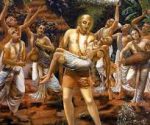Old Fisher Mansion Is Detroit’s Hare Krishna Temple
Detroit, USA – April 14, 2013 (VNN) by By Tina Valentine via Yahoo News
This Amazing Temple Mixes Detroit History With Indian Culture
In the mid-1920s, Lawrence Fisher of the Fisher Brothers Body firm, which supplied parts for General Motors, decided to build amagnificent mansion on the outskirts of Detroit to show off his wealth and good fortune. He hired C. Howard Crane, the man who also built the Fisher Theater, to design this elaborate home. The mansion was built in 1928 at 383 Lenox Ave. in Detroit and cost about $2 million.
Some of the floors and tiled walls have real gold and silver trim in them. There are intricately carved wood ceilings that took two years to build and some Mediterranean-style ceilings. African zebra wood designs are on the walls of one room, and silk fabric adorns the walls of another. The library has real hand-painted leather on the walls, and fossils are preserved in the stone fireplace. Ornate trim can be found throughout the mansion, and some of the original furniture is still there, just as Fisher left it. It’s an incredible part of Detroit history, and it is now The Bhaktivedanta Cultural Center of the Hare Krishna.
From Mansion to Temple
In 1961, Lawrence Fisher passed away, and the city of Detroitacquired the mansion. Since the mansion was not located in an upscale neighborhood, interested buyers were scarce. In 1975, Alfred Ford, great grandson of Henry Ford, and Elisabeth Reuther Dickmeyer, daughter of Walter Reuther, paid $80,000 for the mansion and donated it to the Hare Krishna. In 1976, the Hare Krishna devotees moved in, and they are still there today. The temple is open to the public, and everyone is welcome to come in and enjoy the beauty of the structure, observe or participate in the rituals, and learn about the Indian culture.
Changes Throughout the Years
Everything decays with time, but the Krishnas are devoted to maintaining the building and property as best they can. Most of the original building is still there, and they have done a fine job of preserving the historical craftsmanship. The Krishnas have added beautiful painted murals to some of the walls. Indian statues and paintings are respectfully displayed throughout the temple.
The pool has been filled in due to the high cost of maintenance, the property used to be 4 acres but now ends at the wrought iron gate, and the peacocks have died. The Krishnas do maintain the gorgeous gardens you may have read or heard about, and they will give you a tour of the temple upon request.
The Bhaktivedanta Cultural Center of the Hare Krishna Today
When you enter the temple, you must take off your shoes to help maintain cleanliness, but once you walk through the vestibule doors, you are greeted with kindness. There is a sense of peace and serenity, and everything is calm and stress-free. Radha Raman was my tour guide — he is also the source of most of my information, and he was very knowledgeable about both the history of the mansion and the Krishna god. He told me stories about both the house and Krishna, but the one thing he said that sticks with me the most is that with the Krishnas, he has found more peace than he ever thought he could.
The Hare Krishnas of Detroit have much to offer their community. They offer yoga classes, tours of the temple, rituals, and free vegetarian food for all. They teach respect, meditation, and how to let go of everyday stress. They will even allow you to have a wedding, birthday party, or any special event in their gardens or one of their great rooms. Almost everything is free, although donations are greatly appreciated, since that is their main source of financial support. They do have a store that is open on Sundays only — it is also online, and you can buy books through their website, too. During the week, things are a little slow. If you want the true Hare Krishna experience, visit on a Sunday, when there are between 200 and 400 people there and you can participate in the Sunday feast. Flowers are given to everyone, since they are highly valued in their religion.













